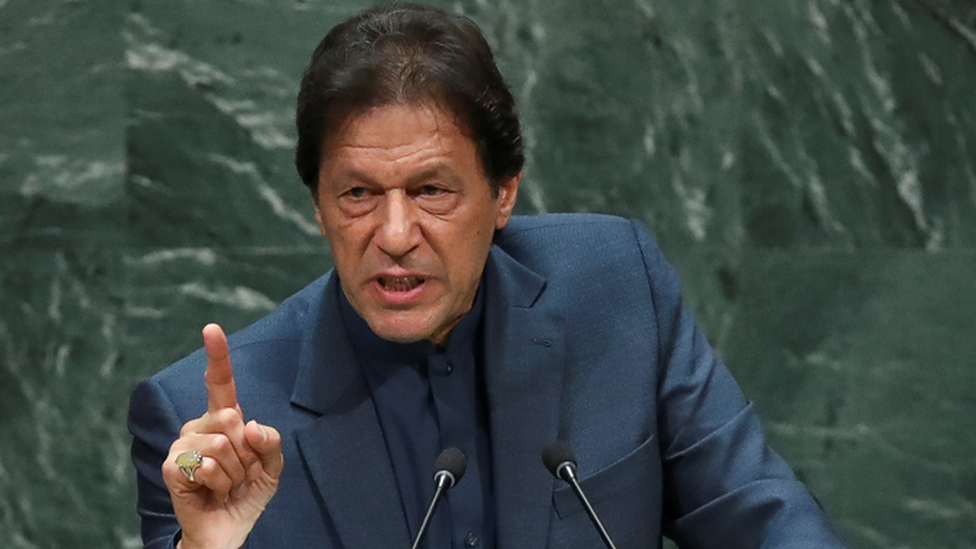Imran Khan: Deadly violence in Pakistan as ex-PM charged with corruption
- Published
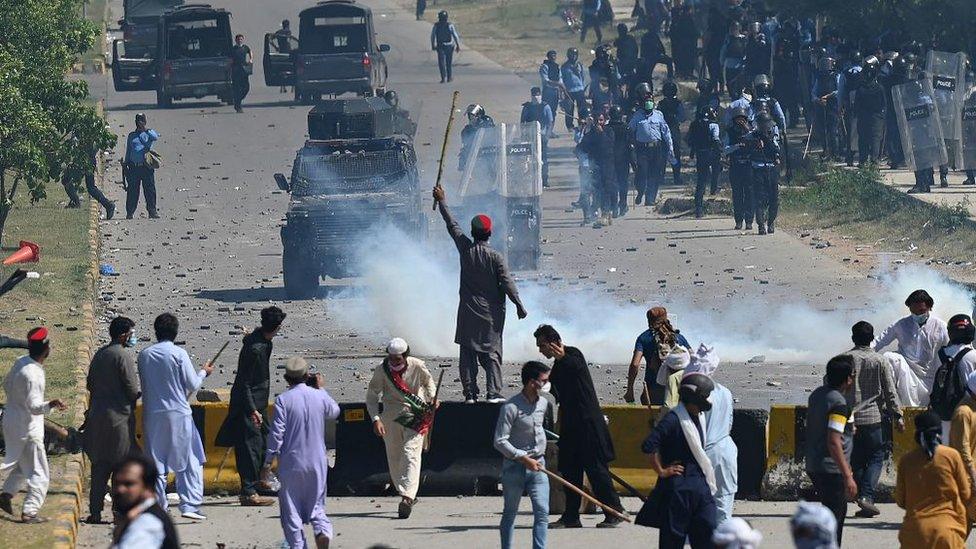
Mr Khan's arrest on corruption charges has sparked protests across Pakistan
Unrest has continued to grip Pakistan after former prime minister Imran Khan pleaded not guilty to corruption following his arrest on Tuesday.
At least eight people have died nationwide in the protests and 1,400 have been arrested, police say.
The army has been called in to quell violence and has warned protesters against more attacks on state property.
Mr Khan's arrest has dramatically escalated tensions between him and the military at a time of economic crisis.
Conviction would disqualify the former international cricket star - and Pakistan's prime minister from 2018 to 2022 - from standing for office, possibly for life. Elections are due later this year.
Pakistan's army has heavily influenced the nuclear-armed country for most of its existence and is a crucial behind-the-scenes player.
Many analysts believe Mr Khan's election win in 2018 happened with the help of the military. But since he was ousted from premiership, Mr Khan has become one of the military's most vocal critics.
On Wednesday, Mr Khan was indicted on charges that he unlawfully sold state gifts during his premiership, in a case brought by Pakistan's Election Commission. Mr Khan denied any wrongdoing.
A day earlier, dramatic footage showed dozens of security officers forcibly removing the 70-year-old from court - where he was attending to separate graft proceedings - then bundling him into a police vehicle.
Mr Khan's Pakistan Tehreek-e-Insaf (PTI) party called his arrest in the capital Islamabad an "abduction" and said it would challenge its legality in court.
The judge has ordered that Mr Khan be remanded in custody for eight days, after which he can seek bail.
This is just one of over 100 corruption cases registered against Mr Khan since he left office. For months he had avoided arrest, with his supporters at times fighting pitched battles with police to keep him out of custody.
One of his Mr Khan's lawyers, Sher Afzal Marwat, said his client was in good spirits.
Amid violent protests nationwide, Mr Khan's supporters ransacked the corps commander's residence in Lahore, smashing chandeliers and making away with peacocks, strawberries and golf clubs - among other things - which they said were bought with "citizen's money". Scores of vehicles and public installations were set alight.
Watch: Peacocks abducted as Khan protesters damage army sites
On Wednesday, the BBC witnessed clashes between protesters and the police in the middle of one of Islamabad's main motorways. More than 145 policemen have been wounded in these confrontations, the police said.
"We came to do a peaceful protest, but these police are shelling us," one man, who was holding stones and a stick and wearing a surgical mask, told the BBC.
"Until our death we will continue this protest or until they free Imran. Otherwise we will shut the whole country."
Mr Khan's supporters overseas have also organised protests in the two days since his arrest.
In a televised address to the nation, Pakistan's Prime Minister Shehbaz Sharif warned that violent protests would not be tolerated.
"The perpetrators who take the law into their own hands will be dealt with an iron hand," he said.
PTI supporters had torched vehicles and hurled petrol bombs at Mr Sharif's residence in Lahore in the early hours of Wednesday, local media reported.
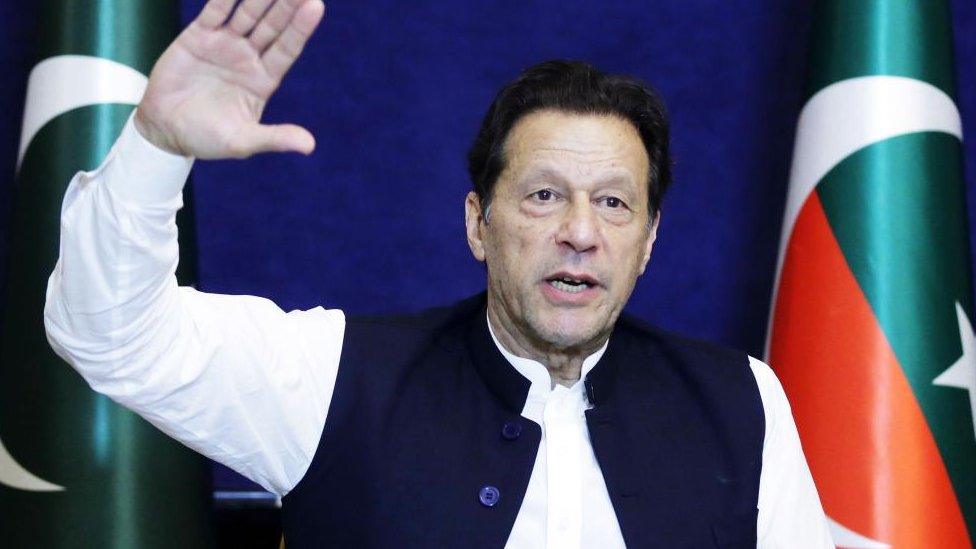
Imran Khan at his residence in Lahore in March
Pakistan's army described Tuesday as a "dark day" and warned protesters of "severe retaliation" against further attacks on military and state properties.
Among the protesters arrested were two senior PTI leaders, including its secretary-general Asad Umar.
Mr Khan was ousted in a parliamentary no-confidence vote last April, less than four years into his term as prime minister.
In November 2022, he was shot in the leg while leading a protest march in the eastern city of Wazirabad demanding early elections.
Mr Khan had accused a senior intelligence officials of carrying out the attack - which the military has strongly denied.
Additional reporting by Farhat Javed, Usman Zahid and Malik Mudassir in Islamabad and Kelly Ng in Singapore
Related topics
- Published5 May 2023
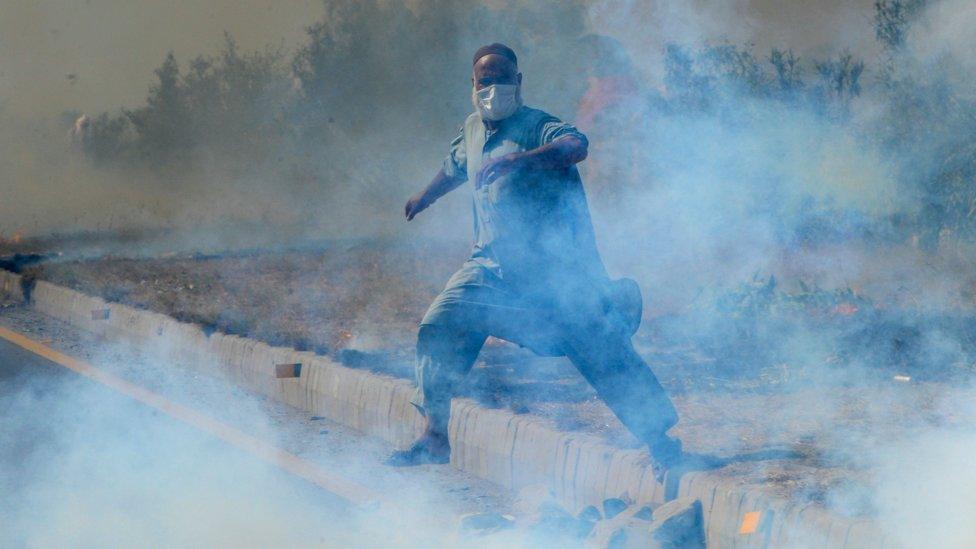
- Published22 December 2022
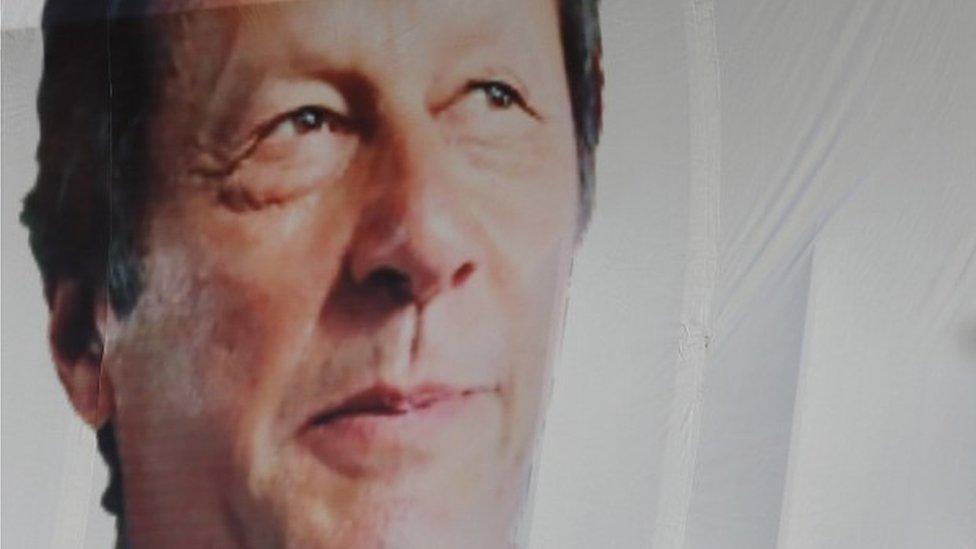
- Published9 April 2022
